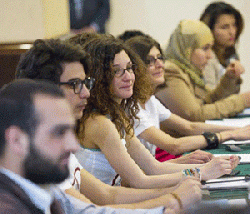BEIRUT — The best and brightest men and women from the Middle East have often gone on to work for the world ‘s largest multinational companies in Europe or the United States. On a local level, this “brain drain” has proved difficult for the economies of Arab countries, many of which are already struggling. Today, however, many Arab students and young graduates no longer dream about working for Google or Yahoo in the United States or Europe, but instead seek to become innovative leaders in their own countries.

|
| A new entrepreneurial generation with big dreams and the ability to make them happen is emerging. |
Young Middle Eastern professionals have become more concerned with proving their creativity and skills on their own turf. From Libya to Lebanon there is a “reverse brain drain” among young workers, with individuals returning from abroad. Others have decided not to leave in the first place. This new generation of entrepreneurs is showing the world that they are capable of creative innovation at home.
One such individual is Hind Hobeika, a young Lebanese woman whose revolutionary invention won her first place at the MIT Enterprise Forum Pan Arab Business Plan Competition. She invented swimming goggles, called Butterfleye, that allow swimmers to track their heartbeat while training.
In an increasingly connected world and a globalized economy, the ambition of these entrepreneurs knows no limits, and they no longer need to leave home to work on products that could have international reach. In the midst of a global recession, instead of looking for jobs, these individuals are creating them. This combination of entrepreneurship and the rise of the technology sector is a boon for local economies.
Various institutions, including television stations, are supporting young entrepreneurs throughout the Arab world. Hobeika started out as a candidate on the Qatar Foundation supported show Star of Science. Now in its fourth season, the reality-TV program aims to shine a spotlight on the next generation of young Arab innovators.
New entrepreneurs can also find financial support and mentorship at institutions like Seeqnce, a Beirut start-up accelerator that has successfully advised and developed over 20 start-ups in the past 18 months, establishing a community of over 3000 entrepreneurs along the way. In Amman, Oasis 500 offers funding and mentorship to selected tech start-ups, and in Cairo, Tahrir Square, launched in April 2011, also offers funding for young entrepreneurs.
Success stories include the Jordanian Maktoob, the world ‘s first Arabic-English email service provider that was founded in 1998 by Samih Toukan and acquired by Yahoo in 2009. More recently, Zawya, a business information service started by Iraqi born entrepreneur, Ihsan Jawad, made headlines when it was acquired by Thomson Reuters Corporation. Another example is Beirut newcomer Cinemoz. Founded by a group of Lebanese professionals from the movie industry, the advertising world, and the web and mobile technology fields, Cinemoz has become one of the Arab world’s first on-demand online video platforms.
The Arab world needs new economic models rooted in science and technology, which can help address the crippling unemployment among educated youth and diversify economies that rely heavily on oil reserves and foreign aid.
A new entrepreneurial generation with big dreams and the ability to make them happen is emerging. But for these entrepreneurs to have a strong impact on their societies, governments will have to provide them with infrastructure that can support their ambitions.
While some Arab countries, like the United Arab Emirates, seem to be moving in that direction, numerous challenges persist. For example, Lebanon, like other Arab countries, still has work to do when it comes to ensuring satisfactory Internet access, which many technology-oriented entrepreneurs require. Recently, the country suffered a two-day Internet blackout after an international cable failure.
On the bright side, events like these are wake up calls for a generation that is increasingly organized and active when it comes to calling for positive change. Lebanon s internet blackout sparked outrage from groups which have been advocating better Internet provision such as Ontornet, #FastLebanon and Flip the Switch.
Young people in Arab countries are becoming accustomed to taking matters into their own hands and their innovative and entrepreneurial spirit won’t go away. They are not solely focused on individual ambitions, but also on improving their countries.
Young Arab entrepreneurs are determined to build countries with policies that will encourage and reward personal initiative, and that will provide the necessary structures that will enable those individuals – and the economies they are a part of – to contribute to the global economy.
– Nada Akl is a freelance journalist in Beirut. This article was written for the Common Ground News Service (CGNews).and reprinted here with permission.






Leave a Reply